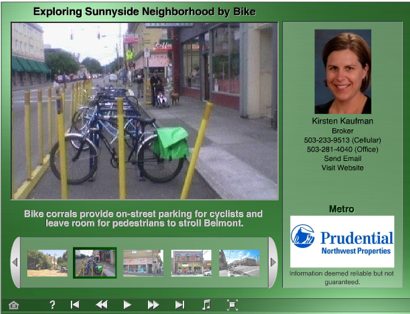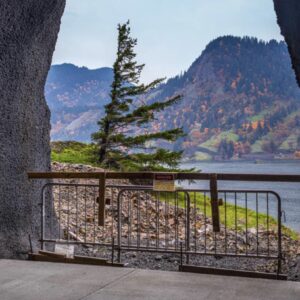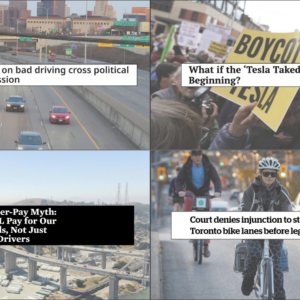
Portland real estate broker Kirsten Kaufman knows that in order to sell a home, you’ve got to first sell the neighborhood. And increasingly, in addition to the quality of local schools and proximity to parks, Ms. Kaufman’s clients want to live in a place that is bike-friendly.
To capitalize on that trend, Kaufman has launched regular “Tour de Homes” where she pedals with potential homebuyers and points out things like bike-parking and bike boulevards.

Full slideshow here
Back in July, she hosted a bike tour of the Sunnyside neighborhood in Southeast Portland. A photo slideshow of that ride published to her website included captions with phrases like:
“Traffic calmed streets and bicycle boulevards make getting around Sunnyside a breeze.”
“Bike corrals provide on-street parking for cyclists and leave room for pedestrians on Belmont.”
“A tuck-under garage provides convenient bike parking.”
Kaufman says she started the tours in June as a way to highlight bike, pedestrian, and transit-friendly neighborhoods. Part of her business plan is to help people who want to drive less and she says that’s “a growing segment of the population, especially here in Portland.”

Kirsten Kaufman
(Photo: Kirsten Kaufman)
“I’ve gotten a lot of interest and positive feedback in the tours,” she says, “And as we cyclists know, there is an intangible and priceless benefit to be gained in ‘quality of life’ by getting out of our cars and into our communities.”
The golden rule of real estate has been always been “location, location, location”, but Kaufman says she’s trying to get people to think instead of, “proximity, proximity, proximity.”
[Editor’s note: For more on proximity, check out this article by contributor Elly Blue.]
Kaufman’s next “Tour de Homes” is planned for the Alberta neighborhood in Northeast Portland. The ride will meet at Black Cat Cafe (1203 NE Alberta St) this Sunday (8/17) at 10 am. Reservations are required and space is limited so email kkaufman [at] prunw [dot] com or call (503) 233-9513 if you’d like to come along.







Thanks for reading.
BikePortland has served this community with independent community journalism since 2005. We rely on subscriptions from readers like you to survive. Your financial support is vital in keeping this valuable resource alive and well.
Please subscribe today to strengthen and expand our work.
Another very cool idea . . . and more mediocre graphics. I have seen another agent\’s signs in N Portland sporting a bicycle.
That\’s pretty much how I\’ve found every place I\’ve lived in for the last 30 years- I\’m surprised no one else has thought of it until now, although I\’m not sure having a \”real estate professional\” spewing hyperbole in your ear the whole time would add much to the experience unless you were somehow incapable of observation or doing research on your own.
There is simply nothing as good as a leisurely bike ride for getting the feel of a neighborhood and spotting worthwhile places to live.
When I was looking for a home in Boulder, CO some years ago, we insisted that we roll around via bike to see homes. It was a great way to rule in/out homes based on our needs. I think it\’s a great differentiator for a realtor to do this. While I share a healthy skepticism for the value-add of a realtor, there are cases where they truly earn their commission and more. Like in any service industry, it\’s finding the people you can trust that is essential.
I wouldn\’t recommend this for everyone, everywhere, but I\’ve found what seems to be a decent indicator of crime in a neighborhood when looking for a house. Leave your bike out front, unlocked. If it\’s still there when you get back, you\’re golden. If it\’s not, you should have locked it up.
John (#4): I won\’t say where this is, but my neighbors leave their bikes out all the time and they\’ve yet to disappear. One friend got picked up for an impromptu road trip leaving his MTB unlocked in a downtown rack for over two weeks. The local shop recognized it and finally called him to say where he\’d left it (yeah, there are some stoners in my town… ;).
Our mail, on the other hand, walks away from time to time.
Am I the only one here who gets a tingly feeling upon hearing of the spread of bicycle culture into the mainstream? The feeling is hard to resist basking in. This time, I think I can resist.
Close-in, bike-friendly, walkable neighborhoods are already very expensive. Home prices there are out of the reach of average Portland income-earners. Ladd\’s doesn\’t need any more boosting to sell well.
Ms. Kaufman has developed a clever sales technique. She is doing good creative work — with a profit motive. (The article did not say otherwise, but tingle-prone people like me may need to be reminded of that fact.) While she does not deserve to be demonized for being good at her job, she should not be lauded as some kind of activist for it, either.
In other words, Jonathan has written an interesting observational piece about a business culture. But business is business.
And let\’s remember, when people in Ms. Kaufman\’s business are succeeding, the non-wealthy are pushed into outer neighborhoods. As a result, those who are most likely to be *reliant* on bicycles and public transit for practical transportation no longer have access to the best facilities. Our public investment in those facilities generates a huge profit for the industry and much convenience for \”choice\” users, while vulnerable people are put out. It hardly seems fair.
Dante #6:
I would like to know what in the article led you to believe that a real estate agent might not be doing business? Business is business, as you say, but failing some big revolution and the ensuing money-free utopia, what\’s the alternative?
People and corporations can act in ways that align their self-interests (profits) with things that are good for the community (the availability of goods and services, as well as jobs), or not. What Ms Kaufman is trying to do is to work on that common alignment. Yes, she makes money doing it; otherwise she might be conducting shopping-cart tours of local bottle return centers.
And while I share your concerns that good walkable/bikeable neighborhoods might be priced out of the budgets of many families, I take it as a positive sign that these neighborhoods are deemed valuable by the marketplace. The solution is to create more of these neighborhoods, thereby reduce the scarcity, not to hope that they be devalued, like in the decades of urban blight and suburban flight that led to so many destructive changes to our national infrastructure. Let\’s face it: when the rich want to live like we do, they\’ll push for the kinds of changes needed to make that life more possible. And, overall, we benefit, because more people will give up their excessive car use, and the trends feed on themselves in a positive feedback loop.
While you may hope that your lifestyle remains ignored and therefore discounted by the marketplace (which means you are exploiting an information gap to your economic benefit), you know that that situation can not last. You can try to scare all the trendy rich people away from your neighborhood in the hope that your rent won\’t go up, or you can join forces with the re-urbanization movement and see how we can transform our country – all the while maintaining vigilance for economic equity.
Nice work, peejay.
peejay,
There are many laudatory articles in The Oregonian, The New York Times, and other sources, about businesspeople in Portland with ecologically friendly practices. If there is ever a mention of the negative effects of their practices on people of median income or lower — in other words, the effects on most people — it is as a footnote. (Well, I can think of one NYT article that\’s an exception.)
Jonathan\’s writing was judgment-neutral, but I thought \”eco-friendly\” people like me would naturally nod in approval, when perhaps we shouldn\’t.
It\’s for those reasons that I was impelled to comment. I don\’t appreciate your attempt to psychoanalyze me remotely.
You state your hypothesis elegantly. I too believe in new urbanism, and that\’s why I am part of the movement. But it happens that in this case I was not talking about theory. I was talking about what\’s actually happening, which matters a lot.
Interesting. When we moved here, we got down to three houses after a long day of house hunting and many moons of neighborhood research. That night she dropped us off, exhausted, and told us to get some dinner, go back to each of the houses in the dark, late on a Sunday evening, walk around the whooooole neighborhood and if we felt comfortable we were golden. Smart lady. It worked. I also like running through potential neighborhoods…
Oops, I meant to say that our realtor dropped us off and told us to walk the neighborhood… different realtor than mentioned in the story.
Wow, Dante made a point about the reality of housing prices in Portland and was summarily dismissed.
…\’corporations can can act in ways that align their self-interests (profits) with things that are good for the community\’
Really?
Hyperbole about the alignment of business and the public good, the sacred \’marketplace\’ and the trickle-down effects of the lifestyles of the wealthy are cliches oft used by the far-right to espouse free-market capitalism as the somehow organic evolution of economies, but I\’m surprised to see these statements go unchallenged on bikeportland.
BeerdedOne has grazed on the edges of a good point–part of helping our society use less energy and adopt a more intelligent transportation strategy absolutely has to be the legislation and enforcement of fixed and FINITE limits on the selling price of real property.
What do they say–housing costs in some areas drop by 10K per freeway offramp?
An uncontrolled free market in property is not part of any solution, rather it is part of a sprawl problem by forcing folks to live unreasonable distances from employment, schools, etc. We need the guts to look this one square in the eye–and poke it with something sharp!
Historically, and absent obscenely irresponsible lending, median housing prices always closely follow median income. Recently, this reality has been stood on its head, at the cost of an exploding debt burden for the average home \’owner\’, all so a few rich lending institutions could get richer.
Contrary to popular belief, the explosion of housing prices in Portland and elsewhere over the last 5 years or so was engineered by the banking and mortgage industries. Now that the easy credit party is over, we will all pay a great public cost to fix these inequalities.
While I\’ve certainly got nothing against Ms. Kaufman personally, I do think that the industry as a whole, and particularly their trade organization, the National Association of Realtors, puts out a lot of intentionally misleading (and self-serving) propaganda about housing costs and home ownership. Unfortunately, the media tends to regurgitate this information verbatim and that is how most of the public form their opinions on real estate matters. The majority of Portlanders will be shocked to find that their homes will depreciate in value over the next several years.
This is just a reflection of the suburban masses flocking back to urban centers. In both scenarios, people of color and poor people will (and do) get shoved out, as Dante pointed out.
Beerded One (12)> This will continue to go unchallenged until Portland residents stop being color-blind to their privilege.
BeerdedOne,
I don\’t think peejay has the authority here to summarily dismiss me. I do think the theory [s]he persuasively summarized is a popular one among smart people because it makes sense. Whatever the reasons, though, the positive results it predicts have never come to fruition.
If a theory makes sense and yet its predictions don\’t come true, either the conditions for it to work have not been met, or there is some subtle flaw in the theory. I don\’t claim to know which is the case here, though I have my private opinions. My observation was about reality, not theory. From it, I drew the conclusion that Kirsten Kaufman\’s work is clever and interesting but nothing to celebrate.
I was not complaining. I was not criticizing Jonathan\’s writing. I was not attempting to demonize the wealthy. I was not espousing my own peculiar theory of the housing or general markets, though I have my opinions there too.
Let\’s all be kind.
Zaphod, #3:
I live in Boulder now, and there actually is a similar service here now. http://www.pedaltoproperties.com. They\’re super nice people, and they donate a ton to CommunityCycles, Boulder\’s non-profit bike shop. Modeled loosely after the CCC in PDX.
Dante-
I disagree that \”the positive results\” predicted when \”[p]eople and corporations … act in ways that align their self-interests (profits) with things that are good for the community\” \”have never come to fruition.\”
I work in the field of renewable energy, and I have seen countless examples of capitalists, both large and small, profiting from the creation of energy projects that are part of the solution to many of our society\’s most pressing problems, the most obvious of which is carbon-emission free energy sources that combat global warming.
I think it\’s clear that the same is now happening in the real estate market, though it is perhaps more difficult to quantify the benefits of people living close to where they work and using a bike to get around town more. This is a service that facilitates riding more for people who used to drive. And that\’s definitely a good thing.
So, to the extent that was your point, I disagree with it, as I mentioned, and also on the basis of reality. But I understood your original point to be that these practices have \”negative effects of … on people of median income or lower\” that are not widely acknowledged.
You said:
\”[L]et\’s remember, when people in Ms. Kaufman\’s business are succeeding, the non-wealthy are pushed into outer neighborhoods. As a result, those who are most likely to be *reliant* on bicycles and public transit for practical transportation no longer have access to the best facilities. Our public investment in those facilities generates a huge profit for the industry and much convenience for \”choice\” users, while vulnerable people are put out. It hardly seems fair.\”
It\’s not. Life\’s not. Gentrification is a reality in Portland and elsewhere, and apparently now easy bicycle transportation has become part of that.
It seems to me that you\’re commenting here on the much broader issue of and social and economic inequity. I\’d like to respectfully suggest that, if that is indeed your concern, there are much more important focuses for you than bikey real estate agents.
I\’d also like to note that, of all the people I\’ve heard talk about the unfairness of gentrification, I\’ve never heard anyone provide a workable suggestion for solving the problem. Suggestsions such as placing limits on real estate values demonstrate a total lack of familiarity with legal restrictions on taking private property, not to mention political reality.
I don\’t mean to defend social inequity, only to point out that there is a broader problem here and it is not caused by people facilitating the purchase of bikeable real estate or by others who profit from more sustainable transportation options.
Dante, #16:
Agreed. I wasn\’t intending to be unkind, if that is how it came across I apologize. I certainly don\’t think we should demonize anyone in this situation, as I think that there is plenty of blame to spread around.
I was simply trying to make the point that sometimes what seems obvious or \’makes sense\’ on the surface often has more complicated explanations that better fit reality. The article didn\’t attempt to address any of these concerns and after reading the interesting rebuttal to your comments, I felt obliged to add my two cynical cents. Peace.
a.O, #18:
You said, \”I think it\’s clear that the same is now happening in the real estate market, …this is a service that facilitates riding more for people who used to drive. And that\’s definitely a good thing.\”
I think you may be conflating two different phenonmena. Riding more and reducing fossil fuel usage is definitely a good thing, but the role the real estate industry has played in driving up home prices in urban centers has almost certainly done more harm than good in the area of fossil fuel consumption.
Consider the macro economics of the US housing market for a moment. According to FED data, the total credit market debt (mortgages, credit cards, auto loans) is now 360% of the U.S. annual GDP. That is hundreds of trillions of dollars, and represents an increase of over 110% from year 2000 levels. Much of that increase is due to the issuance of credit for the purchases of mortgages (residential and commercial), which facilitated the urban \’gentrification\’ process. This money was created by banks out of thin air (debt), but it functions like real capital which has been securitized and sold around the world. In the ensuing eight years, it has been used to build out economies all over the planet. The magnitude of pollution caused as a result of these processes necessarily (demand for goods has increased as a result) dwarfs any reduction in fossil fuels made by persons that may be riding more or driving less as a result of their real estate purchases.
Look: I\’m the last one to defend the practices of the real estate industry in general. They are complicit in the credit/mortgage crisis, and they are deeply connected to the building industry and its desire to blanket the earth with cul-de-sac developments, because for them, it makes their jobs much more profitable. I\’m also the last one to defend corporatism, which is actually the true embodiment of fascism as Mussolini explained. They do not wish to operate in a real free market environment; they wish to monopolize whatever market they enter, and to have the government do their bidding.
However, let\’s agree that 1) money, and 2) the profit motive are not going away, and then we can discuss gentrification in a more realistic light.
It sucks that poor families get displaced when the neighborhoods they live in are priced up. But the solution is not to force an artificially low price on properties in these neighborhoods. The solution is a lot more complicated, but it involves sensible banking regulations that discourage speculative bubble markets, reforms to our zoning laws that presently actually discourage better neighborhoods from being built, and a comprehensive transportation policy that could link up more dense neighborhoods so that more people have opportunities to live in bike/walk friendly places.
The promotion of good living environments to prospective buyers by certain professionals only makes this more possible, as it creates more political will to make these changes. It also generates a stronger tax base so the city has the funding to build a better infrastructure, and creates an environment that might make it profitable for companies (including the evil housing industry) to build in ways that are not destructive to our community.
That\’s all. I think we\’re all in agreement on the core issues here. Let\’s not fight.
I agree with you BeardedOne, and I think peejay has just said what I would have, with emphasis on the last two sentences, so I won\’t repeat.
I read something today that relates to this topic: it was about the very first project that the Portland Development Commission was involved with, back in the early 60\’s. A large portion of SW Portland – over 1000 houses – was obliterated then, because it was viewed as an \”undesirable area\” and a sign of urban blight. This was an area built up as much of inner Southeast is with a mix of single- and multi-unit buildings and businesses.* But because only poor people (at the time, it was populated by working class Italians, Jews, and other ethnic groups) lived there, the city could declare the area an impediment to progress, and destroy it. The result is an expansion of PSU, some apartment towers, and a maze of roadways around I-5 that challenge anyone to get around without a car. The displaced citizens had no political voice to stop this destruction, and Portland lost a huge chunk of its close-in housing stock, with the former residents displaced far and wide. Because it was not valued, it was destroyed.
Before you say that that could never happen to SE Portland, realize that a good chunk of it almost did, with the Mt Hood Freeway project that would have wiped out every neighborhood that borders Division Street. But in this case, there were enough people affected who rose up in opposition, and the project was halted. Neighborhoods were saved in part because they were deemed valuable by the marketplace!
That\’s the end of my little morality fable.
*Go out to Lair\’s Hill neighborhood, to see what the whole area was like. It was also slated for destruction, but Neil Goldshmidt led the charge to declare it a historical area, and saved it. It\’s now a great little neighborhood, if flawed by its lack of easy connections to downtown. And it\’s fairly pricy.